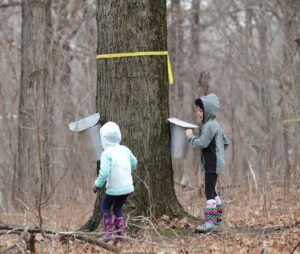
March 1 marks the beginning of spring and kicks off an active and variable weather season. Flooding, temperature swings, tornados and snowstorms are all common springtime weather events.
A flood occurs when water flows into a region faster than it can be absorbed into the soil, stored in a lake or reservoir, or removed in runoff or a waterway into a drainage basin. In early spring, the ground can still be frozen and so cannot absorb the precipitation. Rain and melting snow will instead flow into rivers causing springtime flooding.
As the sun rises higher in the sky and the day’s length gets longer, our temperatures warm. March is the month with the greatest difference between the all-time warmest and coldest days. In March, we often have nighttime temperatures below freezing and daytime temperatures above freezing due to the longer daylight hours. This temperature cycle results in freeze-thaw cycles.
This cycling can cause potholes, as surface water seeps below the surface during the warm days and then freezes at night. The nighttime expansion of the freezing water can cause cracks in the roadway.
This alternate freezing and thawing temperature cycle also causes pressure changes inside trees, resulting in sap flow. Tapping maple trees usually occurs in late winter and early spring. In Wisconsin, March is a prime month for tapping sugar maple trees and this is when the sap is sweetest.
Tornadoes are very destructive events. While tornadoes can occur at any time of the year, tornado outbreaks are probably the weather event most often associated with spring. Tornado activity in the lower 48 states begins to increase in March before peaking in April, May and June.
Snowstorms are not uncommon in March. Their often heavy snowfall can bring down trees and powerlines.
Steve Ackerman and Jonathan Martin, professors in the UW-Madison department of atmospheric and oceanic sciences, are guests on WHA radio (970 AM) at 11:45 a.m. the last Monday of each month. Send them your questions at stevea@ssec.wisc.edu or jemarti1@wisc.edu.

